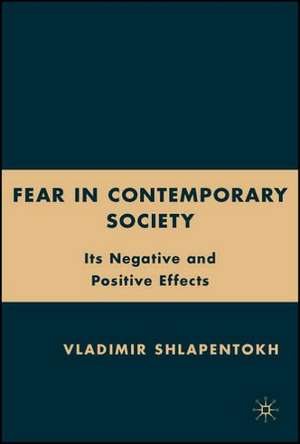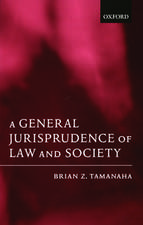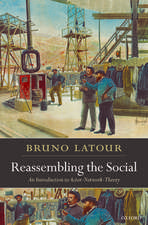Fear in Contemporary Society: Its Negative and Positive Effects
Autor V. Schlapentokhen Limba Engleză Hardback – 2 noi 2006
Preț: 386.81 lei
Nou
Puncte Express: 580
Preț estimativ în valută:
74.02€ • 79.15$ • 61.71£
74.02€ • 79.15$ • 61.71£
Carte tipărită la comandă
Livrare economică 18 aprilie-02 mai
Preluare comenzi: 021 569.72.76
Specificații
ISBN-13: 9781403973894
ISBN-10: 140397389X
Pagini: 235
Ilustrații: XI, 236 p.
Dimensiuni: 155 x 235 x 18 mm
Greutate: 0.39 kg
Ediția:2006
Editura: Palgrave Macmillan US
Colecția Palgrave Macmillan
Locul publicării:New York, United States
ISBN-10: 140397389X
Pagini: 235
Ilustrații: XI, 236 p.
Dimensiuni: 155 x 235 x 18 mm
Greutate: 0.39 kg
Ediția:2006
Editura: Palgrave Macmillan US
Colecția Palgrave Macmillan
Locul publicării:New York, United States
Cuprins
Introduction Social Order in the Contemporary Sociological Literature: The Evolution of a Concept The Major Theories about the Nature and Origin of Values and Order The Limited Role of Positive Internalized Values Aggressive Negative Values National Common Values: Partially a Myth Changes and Stability of Social Values and Norms Fear as a Neglected Variable The Leading Role of Formal Control as the Basis of Order Concluding Remarks
Recenzii
"This book deals with some big themes in historic and contemporary sociology - power, legitimation, sanctions, coercion, and terror for the maintenance of social order. Its head-on challenge to the remaining post-World War II Parsonian paradigm focused on value consensus and socialization should spark not only some intellectual fireworks but engender some vital debates in the contemporary public square." - Suzanne Keller, Professor Emeritus of Sociology, Princeton University"Sociologists have largely ignored the role of fear in society, both as a deliberate policy of oppressive regimes and as a necessary element in the maintenance of social order. Shlapentokh has successfully taken on the task of rectifying this situation. In doing so, he has rekindled debates about social order that have long remained dormant. The result is a nuanced, scholarly, at times personal, sociological, and always challenging perspective on fear." - Lawrence Busch, University Distinguished Professor of Sociology, Michigan State University"Vladimir Shlapentokh is undoubtedly one of the most erudite, sophisticated and productive scholars in the field of Soviet and Russian studies. His interests range far and wide and cover various aspects of Soviet and Russian society. This time he decided to tackle the role of fear as an important force maintaining social order and, as always, he does it in a masterful way. He links fear to the system of values which he believes is indispensable for sustaining that order." - Andrzej Korbonski, Professor of Political Science, UCLA International Institute"Shlapentokh has provided both a critique of Western sociology's failings as well as a careful examination ofa central, but often overlooked, feature of society: that it is held together as much by fearas bythe customary processes of socialization, familial contact, and peer pressures. What is especially useful about thisfeature isthat, since 9/11, American foreign and domestic policyhas been developed with this central premise in mind. The civil wars that gave birth to the greatest English theorist of fear, Thomas Hobbes, have not receded. Democracy, education, and technology have not changed fear's central role in the social calculus. Shlapentokh's work recognizes this and establishes the basis for future serious research." - Peter Stavrakis, Professor of Political Science, National Defense University
Notă biografică
VLADIMIR SCHLAPENTOKH is Professor of Sociology at Michigan State University, USA.















